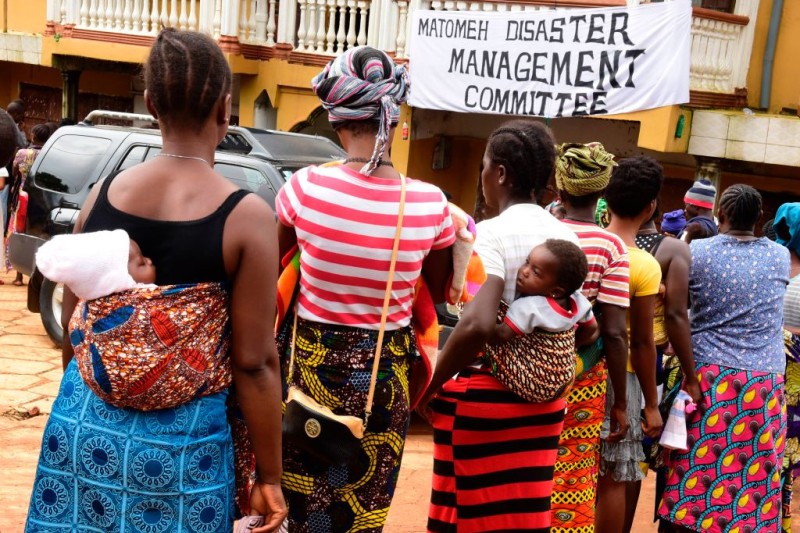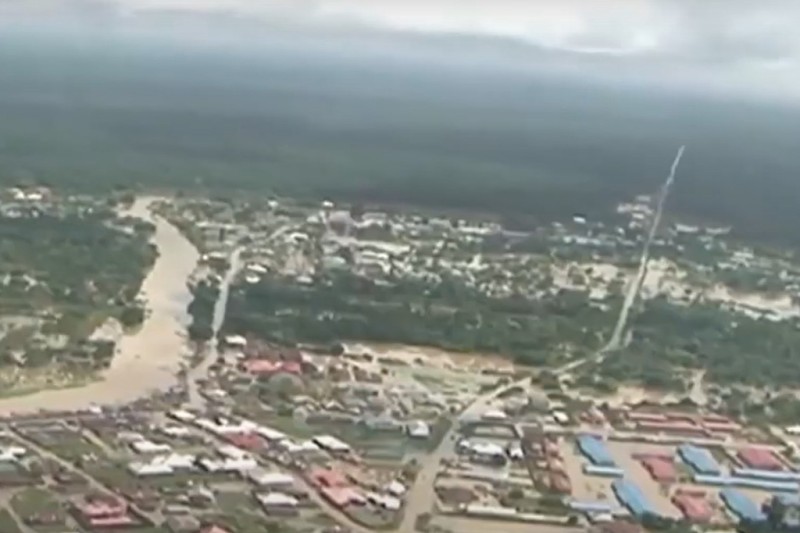2021
Bang, H., 2021. A gap analysis of the legislative, policy, institutional and crisis management frameworks for disaster risk management in Cameroon. Progress in Disaster Science.
https://doi.org/10.1016/j.pdisas.2021.100190
Mbah, M., Bang, H., Ndi, H., Judwin, N., 2021. Community health education for health crisis management: the case of COVID-19 in Cameroon. International Quarterly of Community Health Education.
https://journals.sagepub.com/doi/full/10.1177/0272684X211031106
Ndi, H., Ndi, R., Bang, H.,Mbah, M. and Ndzo, J., 2021. Health and economic imperatives for households in the context of the anti-Covid-19 strategy in Cameroon - The case of Yaounde. .Journal of Humanities and Applied Social Sciences.
https://doi.org/10.1108/JHASS-01-2021-0016
Bang, H., Church Burton, N., 2021. Contemporary Flood Risk Perceptions in England: Implications for Flood Risk Management Foresight. Climate Risk Management.
https://www.sciencedirect.com/science/article/pii/S2212096321000462
Reddin, K., Bang, H., Miles, L., 2021. Evaluating Simulations as Preparation for Health Crises like Covid-19: Insights on Incorporating Simulation Exercises for Effective Response. International Journal of Disaster Risk Reduction. https://www.sciencedirect.com/science/article/pii/S2212420921002119?via%3Dihub
Baker-Beall, C. and Clark, R. 2021. A Post-Copenhagen analysis of China’s Securitization of the Uyghur: A Counterproductive Securitization? Democracy and Security, Vol. 17. No. 3. pp. tbc.
Kenyon, J., Baker-Beall, C., Binder, J., 2021. Lone Actor Terrorism – A Systematic Literature Review. Studies in Conflict & Terrorism. https://www.tandfonline.com/doi/full/10.1080/1057610X.2021.1892635
Shipway, R., Miles, L. and Gordon, R., 2021. Crisis and Disaster Management for Sport. London: Routledge.
2020
Bang, H., 2020. An Overview of the Covid-19 Crisis Management in Cameroon: Decentralised Governance Response Needed. Annals of Disaster Risk Sciences, 3 (2). https://ojs.vvg.hr/index.php/adrs/article/view/34
Bang, H.N., Miles, L.S. and Gordon, R.D., 2020. Challenges in managing technological disasters in Cameroon: Case study of Cameroon's worst train Crash—the Eséka train disaster. International Journal of Disaster Risk Reduction, 44. https://www.sciencedirect.com/science/article/abs/pii/S2212420919304467?via%3Dihub
Bang, H.N., Mbah, M.F., Ndi, H.N. and Ndzo, J.A., 2020. Gauging Cameroon’s resilience to the COVID-19 pandemic: implications for enduring a novel health crisis. Transforming Government: People, Process and Policy. https://www.emerald.com/insight/content/doi/10.1108/TG-08-2020-0196/full/html
Shipway, R. and Miles, L., 2020. Bouncing back and jumping forward: Scoping the resilience landscape of international sports events and implications for events and festivals. Event Management, 24 (1), 185-196. https://www.ingentaconnect.com/content/cog/em/2020/00000024/00000001/art00013;jsessionid=29dsfa5gopjti.x-ic-live-02
Miles, L. and Shipway, R., 2020. Exploring the COVID-19 pandemic as a catalyst for stimulating future research agendas for managing crises and disasters at international sport events. Event Management, 24 (4), 537-552. https://www.ingentaconnect.com/content/cog/em/2020/00000024/00000004/art00008
2019
Bang, H.N., Miles, L.S. and Gordon, R.D., 2019. Disaster Risk Reduction in Cameroon: Are Contemporary Disaster Management Frameworks Accommodating the Sendai Framework Agenda 2030? International Journal of Disaster Risk Science, 10 (4), 462-477. https://link.springer.com/article/10.1007%2Fs13753-019-00238-w
Bang, H., Miles, L. and Gordon, R., 2019. Hurricane Occurrence and Seasonal Activity: An Analysis of the 2017 Atlantic Hurricane Season. American Journal of Climate Change. https://www.scirp.org/journal/paperinformation.aspx?paperid=95950
Bang, H., Miles, L. and Gordon, R., 2019. Evaluating local vulnerability and organisational resilience to frequent flooding in Africa: the case of Northern Cameroon. Foresight, 21 (2), 266-284. https://www.emerald.com/insight/content/doi/10.1108/FS-06-2018-0068/full/html
Baker-Beall, C., 2019. The threat of the ‘returning foreign fighter’: The securitization of EU migration and border control policy. Security Dialogue, 50 (5), 437-453. https://journals.sagepub.com/doi/10.1177/0967010619857048
Shipway, R. and Miles, L., 2019. Reputation and perceived resilience in developing countries bidding for major sports events. In: Walters, G. and Mair, J., eds. Reputation and Image Recovery for the Tourism Industry. Oxford: Goodfellow Publishers, 148-164.
2018
Bang, H., Miles, L. and Gordon, R., 2018. Enhancing local livelihoods resilience and food security in the face of frequent flooding in Africa: A disaster management perspective. Journal of African Studies and Development, 10 (7), 85-100. https://academicjournals.org/journal/JASD/article-abstract/D3D547558962
Bang, H., Balgah, R. and Fondo, S., 2018. Drivers for coping with flood hazards: Beyond the analysis of single cases. Jàmbá : Journal of Disaster Risk Studies. https://jamba.org.za/index.php/JAMBA/article/view/678
Reddin, K., 2018. The Promotion of Grab Bags as Disaster Risk Reduction Strategy. PLOS Currents Disasters. http://currents.plos.org/disasters/index.html%3Fp=36857.html
2017
Miles, L., Gordon, R. and Bang, H., 2017. Blaming Active Volcanoes or Active Volcanic Blame? Volcanic Crisis Communication and Blame Management in the Cameroon. In: Fearnley,, C., Bird, D., Jolly, G., Haynes, K. and McGuire, B., eds. Observing the Volcano World, Volcanic Crisis Communication. Springer.
Walters, G., Shipway, R., Miles, L. and Aldrigui, M., 2017. Fandom and risk perceptions of Olympic tourists. Annals of Tourism Research, 66, 210-212. https://www.sciencedirect.com/science/article/abs/pii/S0160738317301056?via%3Dihub
Bang, H., Miles, L. and Gordon, R., 2017. The Irony of Flood Risks in African Dryland Environments: Human Security in North Cameroon. World Journal of Engineering and Technology, 5, 109+-121. https://www.scirp.org/journal/paperinformation.aspx?paperid=78337
Holdo, G.M., Miles, L. and Hartwell, H., 2017. Disaster nursing: Looking to the future in NORWAY. International Journal of Safety and Security Engineering, 7 (3), 431-442. https://www.witpress.com/elibrary/sse-volumes/7/3/1889
2016
Bang, H., 2016. 30 Years After the Lake Nyos Disaster: What Prospects for Rehabilitation and Reintegration in the Region? Disaster Management, Social Vulnerability, Risk Perception and Relocation Decisions in Cameroon. US: Book Venture Publishing.
Baker-Beall, C., 2016. The European Union’s Fight against Terrorism: Discourse, Policies, Identity. (Manchester University Press, Manchester).
Miles, L., 2016. The five 'C's': Synergies in International Disaster Management and public health and a place for entrepreneurial resilience? Perspectives in Public Health, 136 (6), 323-325. https://journals.sagepub.com/doi/10.1177/1757913916672810
Guderjan, M. and Miles, L., 2016. The fusion approach – applications for understanding local government and European integration. Journal of European Integration, 38 (6), 637-652. https://www.tandfonline.com/doi/abs/10.1080/07036337.2016.1176028?journalCode=geui20
Reddin, K. and MacDonald, G., 2016. Post-incident Follow-up. Health Emergency Planning and Response; Chapter 12, 126 – 137. Sellwood and Wapling Eds. CAB International.
2015
Bang, H., 2015. Disaster Management in Cameroon: The Lake Nyos Disaster Experience. In: Emerald Group, L., ed. New Perspectives in Global Environmental Disasters. Emerald Group Publishing Limited, 57-78.
Sabi, H.M., Mlay, S.V., Tsuma, C.K. and Bang, H.N., 2015. Conceptualizing user preference and trust in western designed banking software systems in developing countries. Journal of Internet Banking and Commerce, 20 (3).
Heath-Kelly, C., Baker-Beall, C. and Jarvis, L., 2015. Editors’ introduction: neoliberalism and/as terror. Critical Studies on Terrorism, 8 (1), 1-14.
Miles, L., 2015. Bridging interdependency?: Nordic 'yes, but ...' - integration from a historical perspective. The Nordic Countries and the European Union: Still the Other European Community?. 15-31.
Miles, L. and Petridou, E., 2015. Entrepreneurial resilience role of policy entrepreneurship in the political perspective of crisis management. Organisational Resilience: Concepts, Integration, and Practice. 67-81.
Miles, L., 2015. Political entrepreneurship as painful choices: An examination of Swedish (post)-neutrality security policy. Entrepreneurship in the Polis: Understanding Political Entrepreneurship. 133-150.
Narbutaite-Aflaki, I, Petridou, E. and Miles, L. (eds.) (2015) Entrepreneurship in the POLIS: Understanding Political Entrepreneurship (Routledge: London).




